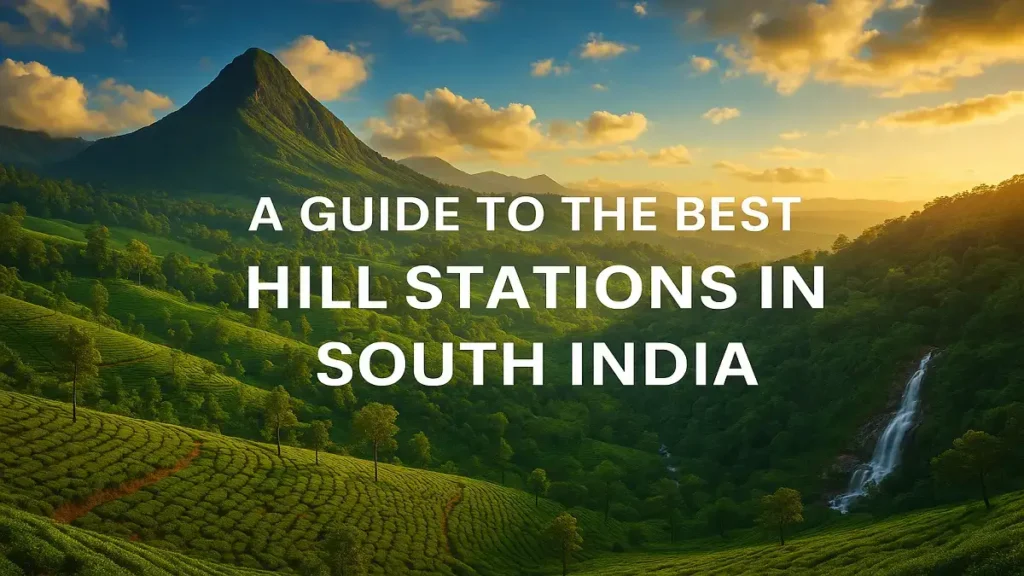A Guide to the Best Hill Stations in South India
South India’s highlands are a soothing antidote to tropical heat. Mist-draped peaks, coffee-scented breezes and colonial echoes greet visitors who trade the plains for cooler climes. Whether you’re a honeymooner searching for romance, an adventurer chasing treks, or a family planner crafting the next getaway, these upland retreats promise unforgettable days. Below, journey through seven of the best hill stations in South India, each woven with lush scenery, culture and stories that linger long after the trip ends.

Snapshot Table: Seasons at a Glance
| Hill Station | Elevation (m) | Best Time to Visit | Signature Landscapes |
|---|---|---|---|
| Munnar (Kerala) | 1,600–2,695 | Oct–Mar for clear skies; Aug–Oct for post-monsoon greenery | Tea carpets, shola forests |
| Ooty (Tamil Nadu) | 2,240 | Mar–Jun; Sep–Nov for quieter slopes | Nilgiri peaks, lake & rose garden |
| Kodaikanal (Tamil Nadu) | 2,133 | Oct–Mar cool & misty | Star-shaped lake, pine forests |
| Coorg (Karnataka) | 900–1,750 | Oct–Mar cool & dry | Coffee estates, waterfalls |
| Wayanad (Kerala) | 700–2,100 | Oct–May pleasant & green | Caves, wildlife, dams |
| Yercaud (Tamil Nadu) | 1,500–1,620 | Oct–Apr clear vistas | Shevaroy ranges, orchidarium |
| Chikmagalur (Karnataka) | 1,000–1,930 | Sep–Mar trekking weather | Mullayanagiri peak, coffee trails |
Munnar: Kerala’s Emerald Tea Bowl
Mist curls over endless tea hedges in Munnar, the crown jewel of Kerala’s Western Ghats. Drive past the Lockhart or Kolukkumalai estates—among the world’s highest—to see dawn splash pink over undulating green.
Key Attractions
- Eravikulam National Park, last refuge of the Nilgiri Tahr and blooming ground for the 12-yearly Neelakurinji flowers.
- Mattupetty & Kundala dams for pedal-boating amid mirror-still reservoirs.
- Tea Museum: watch orthodox rollers whirr before sampling fresh orange pekoe.
Unique Experiences
- Trek Lakshmi Hill or Chokramudi for ridge walks above a sea of tea.
- Time a visit for the next Neelakurinji bloom in 2030—valleys turn violet for six magical weeks.
Best Time: October–March for crisp views; June–September if you love monsoon waterfalls.
Ooty: Queen of the Nilgiris
Founded as a British summer escape, Ooty still charms with colonial cottages and fragrant eucalyptus. Chug up on the UNESCO-listed Nilgiri Mountain Railway, India’s lone rack-and-pinion line.
Key Attractions
- Government Botanical Garden’s 20-million-year old fossil tree trunk and 650+ plant species.
- Ooty Lake for paddle-boats and lakeside cycling.
- Doddabetta Peak—at 2,637 m, stand at Tamil Nadu’s rooftop.
Unique Experiences
- Ride the heritage toy train from Mettupalayam through 16 tunnels and 250 bridges.
- Visit during May’s Summer Festival—rose shows and fruit sculptures fill the gardens.
Best Time: March–June for pleasant days; September–November for quieter, mist-swirled walks.
Kodaikanal: The Princess of Hill Stations
Star-shaped Kodai Lake anchors this dreamy town draped in pine and eucalyptus. Pedal a boat at dusk as lamps twinkle along the 5-km promenade.
Key Attractions
- Coaker’s Walk, a cliff-side promenade offering rainbow-ringed “Brocken spectre” visions on misty mornings.
- Pillar Rocks—three sheer granite columns piercing the clouds.
- Bryant Park’s riot of dahlias during summer flower shows.
Unique Experiences
- Cycle or horse-ride around the lake at sunrise for mirror-like reflections.
- Taste locally made chocolates—legacy of early missionaries—on Seven Roads Junction.
Best Time: October–March cool & romantic; April–June for flower festivals.
Coorg: Kodava Coffee Country
Dubbed the “Scotland of India,” Coorg’s emerald viewpoints and Arabica estates perfume the air with roasted beans.
Key Attractions
- Abbey Falls crashing 70 ft amid spice groves.
- Raja’s Seat garden, once Coorg kings’ sunset throne.
- Dubare Elephant Camp—feed and bathe gentle giants in the Cauvery.
Unique Experiences
- Join a plantation walk to roast your own blend from bean to cup.
- Trek to Tadiandamol or Brahmagiri peaks for valley views touched by morning frost.
Best Time: October–March cool for trekking; monsoon (Jun–Sep) mists the hills in emerald hues.
Wayanad: Land of Legends & Lush Valleys
From prehistoric cave etchings to Asia’s largest earthen dam, Wayanad stitches history with raw wilderness.
Key Attractions
- Edakkal Caves, 8,000-year-old petroglyph galleries reached after a 4000 ft coffee-scented trek.
- Banasura Sagar Dam, India’s biggest earth-fill marvel dotted with islets.
- Chembra Peak’s heart-shaped lake atop 2,100 m meadows.
Unique Experiences
- Night safari in Tholpetty Wildlife Sanctuary for glimpses of elephants or gaur.
- Bamboo rafting on Kuruva Island, a river-ine archipelago of orchids and butterflies.
Best Time: October–May for safaris and trekking; June–September for monsoon magic minus crowds.
Yercaud: Jewel of the Shevaroy Hills
Smaller than its Nilgiri cousins yet equally enchanting, Yercaud rests on a 1,500 m plateau ringed by orange groves and sandalwood.
Key Attractions
- Yercaud Lake—emerald mirror framed by gardens and boat jetties.
- Lady’s Seat, Gent’s Seat & Children’s Seat—a triad of cliffside lookouts for glowing sunsets.
- Botanical Survey Orchidarium with rare pitcher plants and 300+ orchid species.
Unique Experiences
- Trek to Kiliyur Falls, a 300-ft cascade reached via a forest stairway.
- Zip-line or zorbing at adventure parks like Oak Thrill for family fun.
Best Time: October–April clear skies; New Year and May’s Summer Festival draw festive crowds.
Chikmagalur: Karnataka’s Coffee Cradle
Rolling estates blanket Chikmagalur, birthplace of India’s coffee culture. Hikes end with steaming filter brews as clouds kiss the peaks.
Key Attractions
- Mullayanagiri—Karnataka’s loftiest summit at 1,930 m, famed for dawn alpine glow.
- Hebbe & Jhari (Buttermilk) Falls gushing through mossy boulders.
- Baba Budangiri caves honoring the Sufi saint who smuggled coffee beans to India.
Unique Experiences
- 4×4 jeep ride up Kyathanamakki ridge for wind-swept grassland panoramas.
- Camp within Bhadra Wildlife Sanctuary, listening to malabar whistling thrushes under starry skies.
Best Time: September–March moderate treks; June–August for monsoon waterfall roars.
Practical Travel Tips
1. Ideal Seasons
- Winter & early summer (Oct–Mar) offer cool weather across all seven stations, perfect for trekking and sightseeing.
- Shoulder monsoon trips (Jun–Sep) reward with lush vistas but expect slippery trails—carry rain gear and leech socks.
2. Packing Checklist
- Light layers: T-shirts for day, fleece for evenings (temps can dip to 10 °C in Munnar or Kodai).
- Waterproof hiking shoes, umbrella or poncho.
- SPF, sunglasses, and biodegradable mosquito repellent—highlands host sandflies.
- Reusable bottle and cloth tote-minimize plastic waste in fragile ecosystems.
- Here’s our Packing Guide curated for you for your next hill station trip.
3. Getting There
- Rail: Nilgiri Mountain Railway (Mettupalayam–Ooty); overnight trains to Coimbatore (for Coonoor/Ooty) and Kozhikode (for Wayanad).
- Road: All stations connect by scenic ghat highways; opt for early morning drives to avoid hairpin-bend traffic.
- Airports: Cochin (for Munnar & Wayanad via Calicut), Coimbatore (Ooty), Mysuru or Bengaluru (Coorg & Chikmagalur), Madurai (Kodaikanal), Salem (Yercaud).
4. Sustainable Touches
- Stay in homestays or eco-certified lodges—many funnel income to plantation workers and tribal artisans.
- Skip litter-heavy snacks; carry fruit or reusable tiffins.
- Respect wildlife distances; no feeding langurs or venturing off marked trails.
Conclusion
From tea-scented Munnar to the coffee kingdom of Chikmagalur, the best hill stations in South India blend nature’s artistry with cultural mosaics. Each hillside tells a tale-of British locomotives puffing uphill, of ancient tribes carving stories in stone, of waterfalls echoing through rainforest canopies. Plan thoughtfully, tread lightly, and let the mountains gift you cooler air, slower hours, and memories steeped like a perfect South Indian brew.




